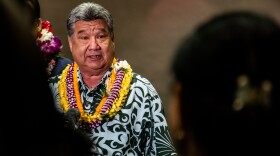Chapter 201H is a law that allows project developers to ask for exemptions from a number of county zoning restrictions — and one of the main tools used to support affordable housing in the state.
But it's not an easy process for approval.
"You need to provide 50% plus one unit of affordable housing to be considered for these waivers," said Grant Chang, principal architect at Lowney Architecture.
His firm, which is based in California and Hawaiʻi, builds affordable housing in addition to commercial and hospitality designs. Grant Chang told HPR his firm has gone through the 201H process.
In addition to the number of units reserved for affordable housing, he said there are other obstacles in the 201H process that hinder the development of affordable housing.
"There's added time. As part of the process, you are required to get City Council vote and approval," Grant Chang said. "So although you can ask for all of this stuff, it doesn't mean it's all going to be approved."
According to Grant Chang, the process adds an additional six months of administrative processing. That doesn't include the wait time for a building permit. On Oʻahu, he said that is now between 8 to 12 months.
Gov. Josh Green called on his administration and state lawmakers to find ways to promote affordable housing this session.
One lawmaker introduced several measures to change the 201H law to not only streamline the process, but ensure residents are benefitting.
"I think the beneficiaries of 201H are really the middle class," said Sen. Stanley Chang, the chamber's housing committee chair. "The biggest concern that I hear about our housing inventory is that we don't want to build more housing, only to watch it fall into the hands of wealthy overseas investors and creating these dark towers."
The senator, who has no relation to the architect Grant Chang, has introduced a handful of measures that would help maximize projects going through the 201H law.
Senate Bill 872 would provide several exemptions to the current 201H law, as long as the units are owner-occupied and owners don't own other real property.
According to the senator, this would help families that fall within 140% of the area median income. For a two-bedroom condominium unit, the price would fall somewhere $675,000 — below market rate, but not cheap, he said.
"We all know housing is so out of reach for so many people here in Hawaiʻi. I think [the proposal] is truer to the intent of what I've seen from the voters, and also really forces developers to cater to that local market rather than looking abroad," said Sen. Chang.
Another proposal is Senate Bill 338. This proposes combining four of the state's housing offices under one agency — the Department of Housing. The department would then be headed by the governor's housing director and according to the senator, this would give institutional weight to housing efforts in the state.
Sen. Chang added that this would also prevent opposition to projects. He told HPR this would counter the "Not In My Back Yard" arguments of projects not being right in a certain community, by having the department choose parcels for projects from its inventory.
Grant Chang believes this proposal would also help developers find parcels to build projects on. He told HPR for parcels along the rail line, they would pick the interest of developers.
Additionally, Senate Bill 332 would prevent the City and County of Honolulu from enacting any new ordinances that would restrict housing density within 0.5 miles along the rail line. For Sen. Chang, this would promote dense housing developments on state lands.
"We're not going to be re-developing any existing neighborhoods, these are all state-owned parcels, none of which really have housing on them right now," Sen. Chang said.
Sen. Chang cited community opposition to building dense high rises in Oʻahu neighborhoods. With this proposal, he argues several high-rises along the rail route wouldn't change the character of neighborhoods.
Another proposal Sen. Chang introduced is Senate Bill 863 — making state housing subsidies more efficient. The measure creates the Hawaiʻi Residential Developers Loan Corporation, which would guarantee and ensure loans made by banks to developers.
If approved these measures wouldn't solve the housing shortage in Hawaiʻi, but Sen. Chang told HPR it would certainly move the needle.
"We have about 15,000 Hawaiʻi residents leaving the state every year now, which is now more than the number of babies that are born in the state of Hawaiʻi," he said.






